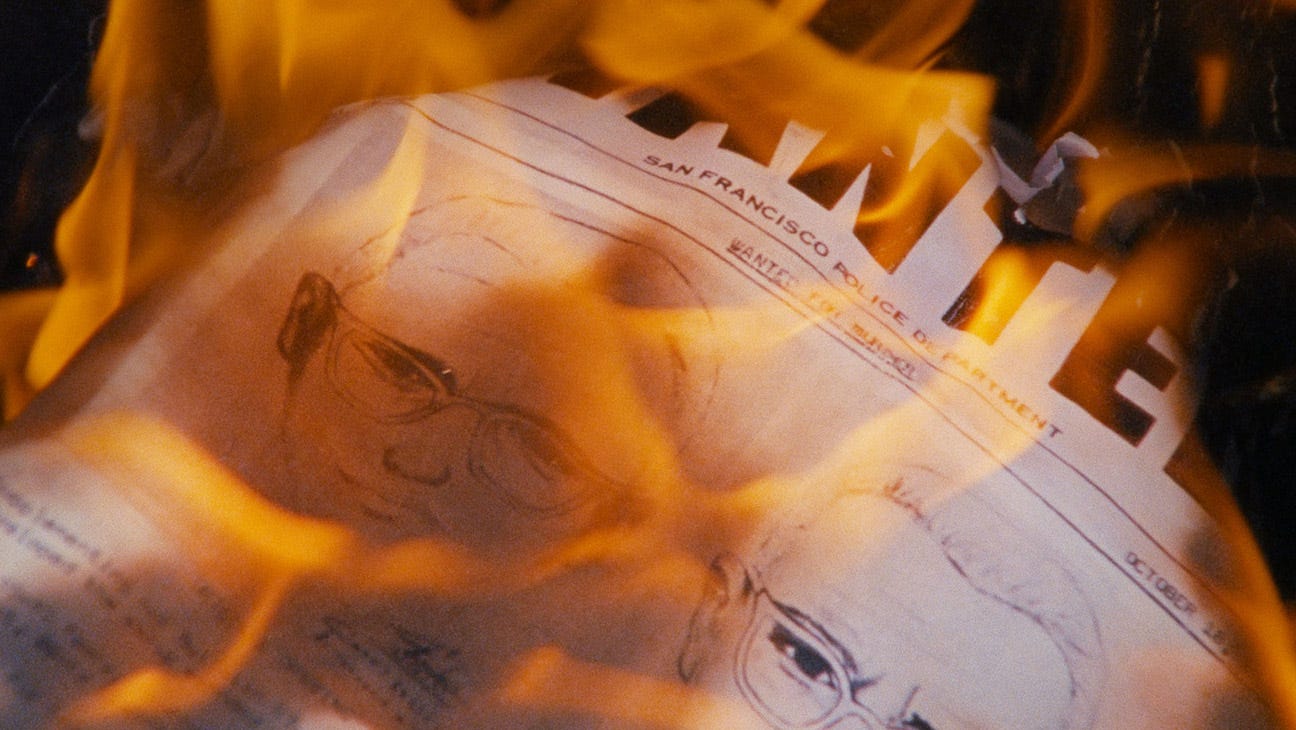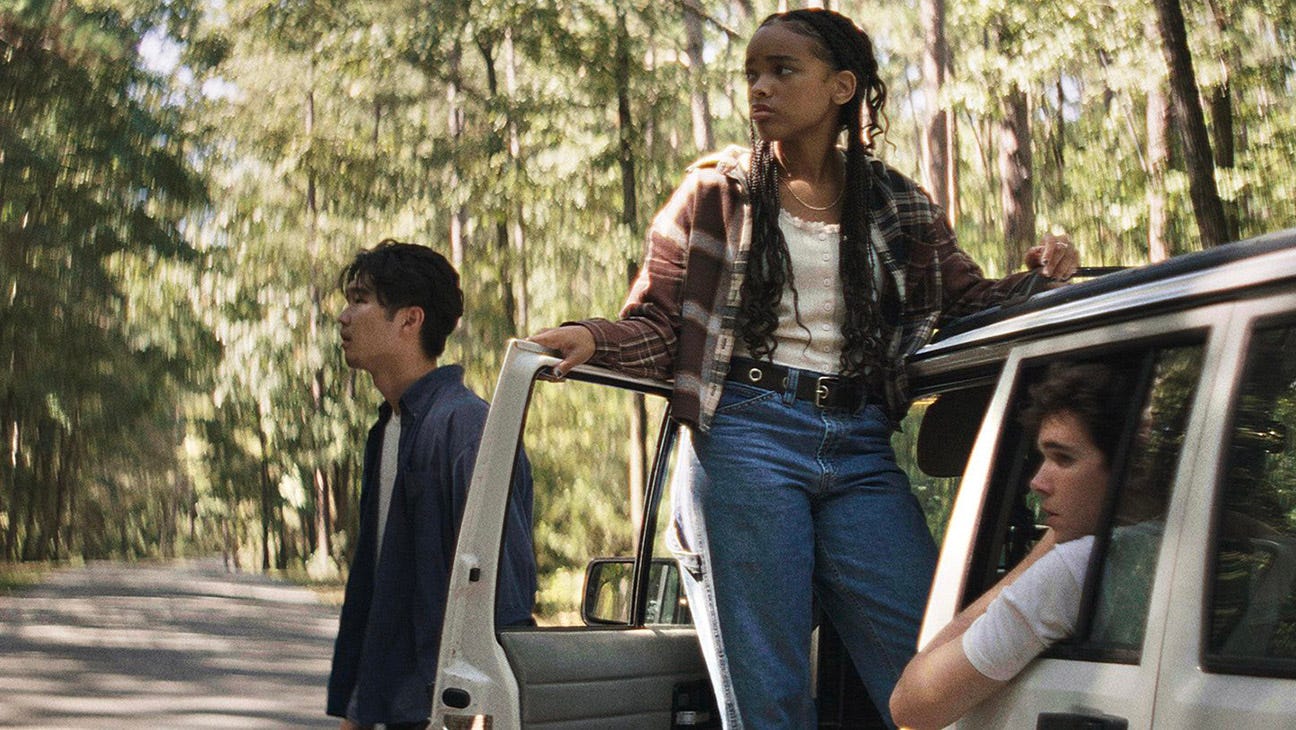CCFF 2025: Lurker, Zodiac Killer Project, It Ends
Our coverage of the Chicago Critics Film Festival starts with a trio of films from three emerging directors.
LURKER
When rising pop star Oliver (Archie Madekwe) enters the hot streetwear shop where Matthew (Théodore Pellerin) works, bromance is in the air. Matthew cues up a song on his phone — Oliver's favorite, as it happens — prompting them to strike up a conversation. It would read as buddy kismet had we not just watched Matthew scan Oliver's socials to find just the tune to grab his attention. You get the sense Matthew doesn't listen to much music, but he clearly understands fame. Oblivious, Oliver is charmed and insists Matthew come over to collaborate on an upcoming project. By scene's end, one of them thinks he's made a new pal. The other looks like a wolf about to pounce.
At its peak, Alex Russell's pop-thriller Lurker feels so alive it almost shimmers off the screen. Russell, who's honed his observational skills on TV series like Beef and The Bear, depicts narcissism in the influencer age with urgency and bite, crafting a quintessentially messy film for the terminally online. But when it cools off, Lurker can sometimes feel like scrolling through yassified Talented Mr. Ripley clips on TikTok — stylish, sinister vibes that are far too easy to consume and dismiss.
Lurker is well-performed, at least. Pellerin's hungry energy adds texture that is sorely missing from the character as written. That scene I described is how the film begins, which forces viewers to retroactively parse minor cues to track Matthew's intentions and methodology (hey, he is always on his phone!). This marginalizes elements that could make him, if not sympathetic (this isn't that movie), then intriguing — like his vague relationship with his aging grandmother or the fact that he still lives with her well into his twenties. More insight into his fragile mental state in the beginning might have made the hostile turns to come (say nothing of the extent of his grandiosity) hit harder.
Oliver doesn't fare much better. Madekwe is a terrific casting coup; he brings charisma and credibility to a character that struggles to resonate beyond his burgeoning icon archetype. He sings, dances, cries on cue — and when Matthew later slithers back into Oliver's circle after being tossed out for rancid behavior (a salacious plot point Russell is either too disinterested in or squeamish to explore), Madekwe's body language shifts downward, revealing a deeply felt aura of resentment and terror. Lurker excels due to the strength of its leads; one scene between them, set in a confining recording booth, may be among this year's best.
It's an ominous bop, but a bop nonetheless. Cinematographer Pat Scola (Pig, A Quiet Place: Day One) frames these star-crossed frenemies with style and immediacy; Russell splices the imagery with frantic handheld B-roll (Matthew, with his omnipresent camera, is always looking), giving Lurker the aspect of a music video epic. The screenplay could have stood to pause on Matthew's darker turns, yet Russell just manages to wring out the dread he seeks, his final twist thrilling in its cynicism. Matthew ascends, all right — he's become Tom Ripley of Insta-fame, a star-devourer of chilling aspect.
6 / 10
Lurker had its Chicago Critics Film Festival premiere at the Music Box Theater on May 2.
Written and directed by Alex Russell.
Starring Théodore Pellerin, Archie Madekwe, and Havana Rose Liu.
100 mins. / Unrated. Contains hints of sexual misconduct, and someone gets a faceful of fists.
ZODIAC KILLER PROJECT
The story goes that British filmmaker Charlie Shackleton once secured the rights to adapt Lyndon E. Lafferty's widely disputed 2012 account of the unsolved Zodiac killer case, titled "The Zodiac Killer Cover-Up: The Silenced Badge," into a true-crime documentary. Before production could begin, the rights were rescinded, and his project collapsed. But rather than nurse his wounded pride and direct his energy at a new project, Shackleton, in an embrace of the sunk-cost fallacy, experimented with the bones of the project he could not fully abandon and created something entirely different.
If that sounds poignant and/or exciting to you, hold on. Even when approached as an offbeat Kodachrome might-have-been, Shackleton's new film, Zodiac Killer Project, can be a frustrating viewing experience. Working primarily with his outline and a not-insignificant number of sour grapes, Shackleton endeavors, with some sweatiness, to alchemize two competing creative impulses into a quaffable, festival-friendly elixir: sardonic media criticism fused with the angst of a frustrated artist. The result is a bitter salvage job, a director's commentary without a film to commentate on, made with aggravation and a smidge of contempt aimed at the sensationalist genre practices Shackleton once deemed appealing enough to emulate.
So, a true-crime documentary that never was. Appropriately enough, something this abstract unfolds with purposeful and frequently amusing anti-cinematic quality. Carefully held frames — shots of kitchen tables, deserted roads, lots (and lots) of parking lots — accompanied by Shackleton's softly exasperated narration detailing what could have filled them. A detailed list of true crime's tired grammar, namely its hackneyed use of visual shorthand, called "evocative B-roll" (e.g., tape players spinning over recorded dialogue), and "backtors" (extras resembling the subjects filmed from behind) — for a time, Zodiac Killer Project presents an artfully cogent argument against true crime.
Then, contradiction: Shackleton peels back the pretense and deploys these tropes into the structure of his film. He cites Making a Murderer and The Jinx, among several others, as egregious examples of this hackery, only to confess in the same breath that he willingly uses these tricks, too, which he laughs at. Shackleton further blunts his premise by ducking a sticky, possibly unflattering question: why did he want to make a decades-dusty documentary about the Zodiac killer in the first place? Was it to explore an unsolved American mystery? A means to mock Lafferty's bewildering pursuit of his primary suspect? An easy-street path to fame and fortune?
"How many people are going to watch this? Realistically?" Shackleton asks later on. It's a rhetorical question loaded with disappointment and possibly relief. Had it come to fruition, his original project would have been swallowed whole by the leviathan genre's incalculable dross, his efforts left underappreciated. Instead, he's made something far more niche, less marketable, but just as artistically dubious. The pursuit of broader appeal has burned Shackleton, and now he's made a movie for an audience of one, choosing to narrate the void and finding cold comfort in the results.
4.5 / 10
Zodiac Killer Project makes its Chicago Critics Film Festival premiere at the Music Box Theater on Wednesday, May 7. For tickets, click this.
Directed by Charlie Shackleton.
91 mins. / Unrated. Contains an excessive amount of salty frustration.
IT ENDS
A road trip with friends becomes an existential paradox in Alex Ullom's It Ends, a reflective, well-crafted quasi-horror mood piece steeped in dread for the future and a bleak yearning to just get on with it. It's a film that meets the moment: as our very real world spins further into geopolitical volatility and economic turmoil, the future is sure looking like something to fear, not anticipate. In this respect, Ullom's fabulistic detour onto an infinite highway of uncertainty and doubt — where his young cast grapples with what makes life worth living, to their collective woe — feels timely. Not much fun, but certainly appropriate.
In It Ends, escape is the hook, not escapism. The film follows four friends — Tyler (Mitchell Cole), James (Phinehas Yoon), Day (Akira Jackson), and Fisher (Noah Toth) — who pile into a white Jeep Cherokee for one last evening together before life separates them for futures that, to them, don't seem very appealing at all. James, the group's pragmatist, recites the milestones ahead with cool detachment, an itinerary of successes and disappointments, as though the path ahead is preordained to be a drag — an early indicator that these characters are due for a serious philosophical gut-check.
To Ullom's credit, he doesn't make us wait for the twist. After some pouty Gen-Z joshing about memes and malaise, Tyler, their brawny, Southern-fried driver, misses the turn that will take them to their destination — or he seems to. Instead, their road has inexplicably stretched into a rural Möbius strip where distance is a mirage. Time passes as it usually does (day still becomes night and so on), and the odometer continues to climb, yet hunger, sleep, and bathroom breaks are somehow no longer an issue. Reality detaches from routine.
Worse still are the strange hordes of screaming people who rush the Jeep anytime it stops, giving them plenty of incentive to keep the wheels spinning. This aspect of Ullom's premise gives the film's first act a visceral charge and a sense of looming danger that is later diminished to make room for the more cerebral terrain ahead.
It Ends is, ultimately, more meditative than menacing, more youth drama than horror roadshow. Its metaphorical ponderings go on (and on), the presentation is spartan and monotonous (though sharp edits and sound design keep things engaging), and the film's tone eventually lands on the mopier side of sanguine. But what keeps It Ends from leaving a lasting impression is how polite its characters are in the face of cosmic adversity; they engage in cathartic scream therapy to unwind and remain largely respectful to one another, even when their bickerings get testy. Ullom is less interested in how humanity veers into vicious territory during catastrophe than he is in exploring how this can change us for the better — a noble if prosaic sentiment to mull over as we exit the theater to face our personal unknowns.
6 / 10
It Ends had its Chicago Critics Film Festival premiere at the Music Box Theater on May 4.
Written and directed by Alex Ullom.
Starring Mitchell Cole, Akira Jackson, Noah Toth, and Phinehas Yoon.
87 mins. / Unrated. Contains some grabby strangers and a concerning case of the sads.
Our Chicago Critics Film Festival coverage continues this week.







